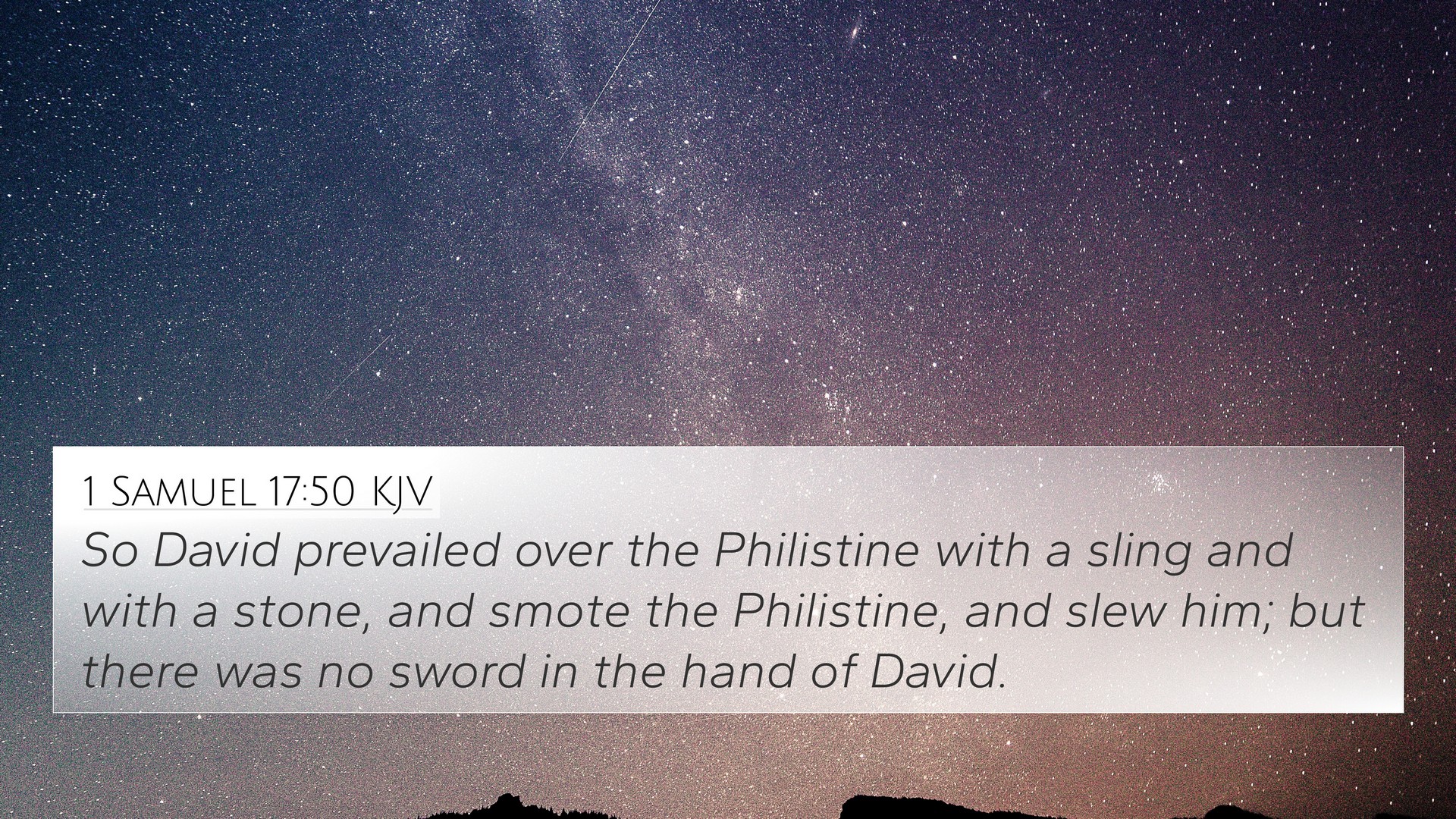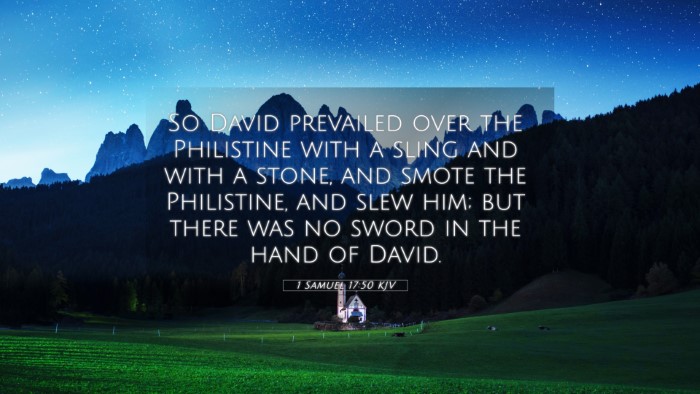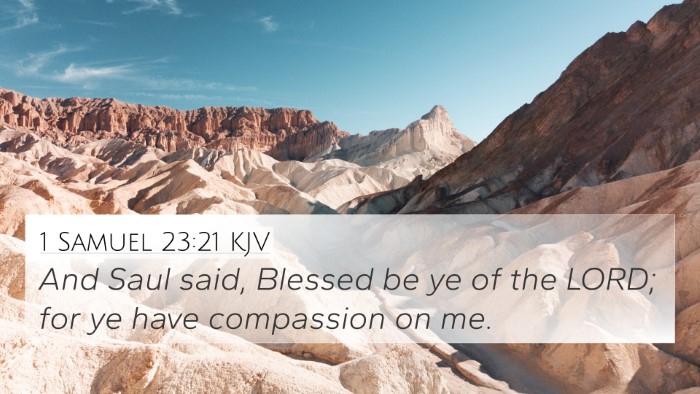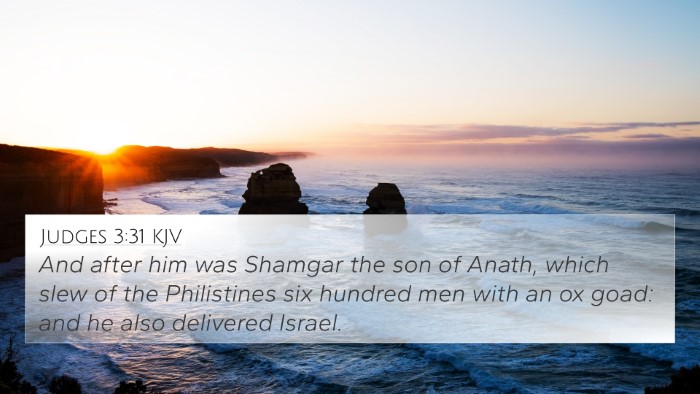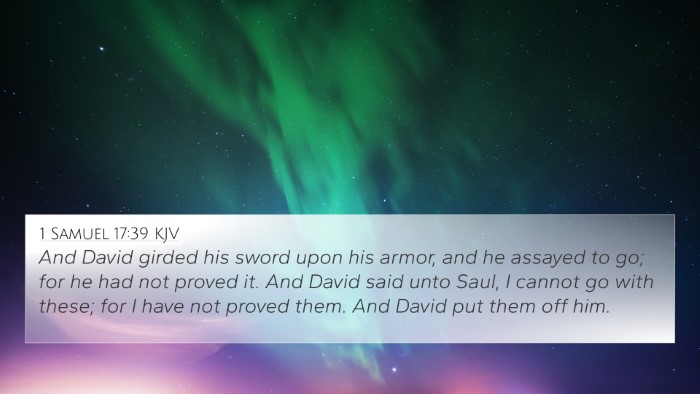Understanding 1 Samuel 17:50
Bible Verse: 1 Samuel 17:50 - "So David triumphed over the Philistine with a sling and a stone; without a sword in his hand he struck down the Philistine and killed him."
Verse Meaning
This verse highlights the remarkable victory of young David over the giant Goliath, illustrating themes of faith, courage, and divine intervention. The defeat of Goliath by a shepherd boy armed only with a sling and a stone serves as a powerful reminder that true strength and victory come from reliance on God rather than traditional weapons or worldly might.
Commentary Insights
Matthew Henry's Commentary
Henry underscores the significance of David's victory as an act of divine providence. He emphasizes that David's triumph illustrates God's power in weak vessels, showcasing how God can use the humble and the meek to achieve His purposes. Furthermore, David's faith in God is a central theme, suggesting that reliance on God, rather than personal strength or weaponry, is what truly enables victory.
Albert Barnes' Notes
Barnes reflects on the method of David's victory, indicating that it symbolizes the defeat of evil through what seems foolish or weak to the world. By using a sling and a stone, David's victory serves as a testament to his faith in God, illustrating how, through faith, even the most formidable enemies can be conquered. Barnes draws attention to how this event established David's reputation and foreshadowed his future as King of Israel.
Adam Clarke's Commentary
Clarke examines the implications of David's victory, noting that the emphasis is on God's ability to rescue His people with the most unlikely of means. Clarke also points out the significance of the sling and stone, which represent faith in action; it wasn't just a lucky throw, but a deliberate act of trust in God's promise. This victory also serves as a spiritual metaphor for overcoming life's giants through divine assistance.
Cross-References
- 1 Samuel 16:12-13: David is anointed as king, highlighting God's choice of the insignificant to fulfill great purposes.
- Psalms 20:7: "Some trust in chariots and some in horses, but we trust in the name of the Lord our God." This connects to the faith that David displayed.
- 1 Corinthians 1:27: "But God chose the foolish things of the world to shame the wise," showing a parallel in how God operates.
- Hebrews 11:32-34: The hall of faith illustrates how faith led to victories over enemies, akin to David's triumph.
- Isaiah 54:17: "No weapon forged against you will prevail," relates to David's unconventional victory.
- 2 Corinthians 10:3-5: Paul speaks about spiritual warfare, aligning with David's battle against a seemingly insurmountable foe.
- Romans 8:31: "If God is for us, who can be against us?" emphasizes God's support during trials, similar to David's experience.
- Matthew 17:20: Jesus teaches about faith that can move mountains, reflecting the core belief that enabled David’s victory.
- Philippians 4:13: "I can do all things through Christ who strengthens me," embodies the spirit of David's confidence in God.
- James 4:6: "God opposes the proud but gives grace to the humble," correlating with David's humble beginnings as a shepherd.
Thematic Connections
David's battle with Goliath is not merely an event but a rich narrative filled with thematic connections throughout the Bible. These themes include:
- Faith in God during adversity.
- God's choice of the unlikely heroes.
- The significance of spiritual weapons over physical ones.
- The idea of divine providence and intervention.
- The triumphant nature of God's people against overwhelming odds.
Conclusion
1 Samuel 17:50 encapsulates not only a historical event but also the essence of faith—a testament to God's ability to provide victory against all odds. Through these commentaries and cross-references, we recognize that the story of David and Goliath is one of many instances demonstrating God's unwavering support for those who trust in Him. This narrative encourages believers today to lean on their faith, no matter the size of their challenges.
